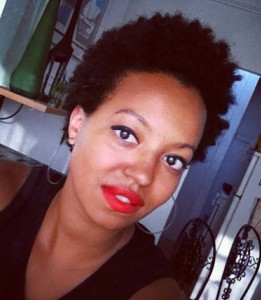Note: Nicole is former s taff, current member leader and author of our recent book, Between the Silver Spoon and the Struggle: Reflections on the Intersection of Racism and Class Privilege. This interview is reposted from BlackGivesBack.com.
taff, current member leader and author of our recent book, Between the Silver Spoon and the Struggle: Reflections on the Intersection of Racism and Class Privilege. This interview is reposted from BlackGivesBack.com.
Between a Silver Spoon and The Struggle: Reflections on the Intersection of Racism and Class Privilege is the newly released book by Nicole Lewis and Resource Generation. A central question of the book: Can rich kids really be down?
Nicole describes herself as “a writer, free-thinker, and food enthusiast…who writes about the food she creates in her tiny Brooklyn kitchen.” Her foray into donor organizing began at the University of Michigan, where she volunteered as a facilitator of peer dialogues about privilege and oppression and researched models for organizing from a place of privilege. Enthusiastic about her book, Nicole looks to bring more people of color with wealth into the social change fold.
Hometown: Washington, DC
Education: BA, English Literature & Women’s Studies, University of Michigan
Professional Work: Freelance Writer and Social Media Strategist. Formerly, a National Organizer with Resource Generation
Philanthropic Involvement: Advocates for Youth (former Board Secretary), a youth-serving organization focused on reproductive rights
What motivated you to write “Between A Silver Spoon and The Struggle”?
I actually inherited this project from Resource Generation (RG). The organization needed to put together a reflection on the intersection of race and class as part of a grant they received from the Kellogg Foundation to support the organizing of folks of color with wealth. When I started at RG in 2009 the idea of a book was waiting for me.
The project didn’t really become “Between A Silver Spoon & The Struggle” until I had been with RG for two or so years, and picked up the project again. In my two years of organizing people of color with wealth and class privilege I realized that we didn’t really have a shared sense of why it was important for us to participate in social change work. There were so many questions that came up in one-on-ones about where we belonged, about race and racism, about whether or not we could really claim a wealthy identity, and about class and money.
When I started my transition out of RG it seemed timely and necessary to close out my experience with a sort of reflection, an attempt to answer some of the questions that came up time and again, and a chance to ask new questions as well.
How and when did you undertake this effort?
I started writing in 2009, and actually wrote a first version of the book, which we subsequently tabled. I picked up the project again in 2011. But in a way I have been researching this project my whole life thus far.
What surprises did you encounter while writing the book? What insights did you gain?
For starters, it’s really difficult to write a book! Surprise surprise, right? I thought the ideas would pour out as I had already done all this work both personally and intellectually around class and race, but when I sat down to write I quickly realized it is incredibly difficult to convey these big and complex ideas in a way that is succinct, accessible and serious but funny at the same time. I quickly realized I didn’t learn things in a linear and direct manner, instead everything I thought came to me overtime and in pieces. So I learned to take it piece by piece.
A huge insight that was reinforced for me is that it is incredibly difficult to talk about class or race in isolation. This fact shows up in writing so obviously. I would sit down to write sections just on class only to read them again and see I was so clearly talking about race, too. So it was a good exercise in actively examining the two, and being specific in my language.
One of the more moving things I realized while working on this project is that everyone truly has a story to tell. I spoke with so many wonderful people about their journey towards social change work and saw aspects of my own experience reflected in each and every one of their stories. It is a very humbling experience to share our stories with one another. The process of listening and asking questions certainly helped me feel more hopeful about the work we are doing.
What do you hope readers will take away from your book?
Primarily I hope this book sparks a conversation. I hope people are moved to examine their own experiences with both race and class and that they share their findings with others. I’ve always understood “Between A Silver Spoon & The Struggle” as a movement-building tool.
Naturally, there are a couple central themes I hope readers will take away too. The first is that people of color with wealth have a tremendous stake in working towards both the elimination of racism and the restructuring of our economic system. And the second, and perhaps more complex and overarching takeaway, is that wealth building cannot stand in as a substitute for the complete dismantling of racism and the systems that perpetuate economic inequality. For folks of color with wealth, if we don’t actively participate in this critical work as volunteers and organizers—not just as thought leaders and funders—and if we don’t share our stories and experiences, then we run the risk of our stories being used to strengthen the assertion that we have moved into a post-racial era and that wealth building above all is what folks of color need to thrive. But when we participate, we can own our stories and use them in a way that strengthens our work to eliminate racism and economic disparity.
What are your sights set on next?
I think it’s a really interesting time—a great time to take on issues of race and class. So much great journalism and analysis are happening already, and I am looking for ways to specifically work on the intersection of racism and class privilege.
In terms of concrete projects, I have my sights set on a memoir for my grandfather. He has been audio-recording himself over the past couple years, and his story is so timely. On the surface it looks like a typical bootstrap success story. He was born the son of a coal miner in rural Pennsylvania and became a Colonel in the Air Force. He often tells this story of a time when one of his white peers addressed him as “boy.” He cleverly replied, “That’s Mr. Boy to You,” which is what I want to call the memoir. In his later life, he has had all these revelations about the way he defined success as a young man. It was largely in terms of achievement, but I think he realized, looking back, that no matter the position he attained or how much money was made, to not be afforded a kind of basic respect is a huge loss. So through his story I want to look at issues of achievement, place, belonging and power.
Contributed by Valaida Fullwood
Described an “idea whisperer,” Valaida brings unbridled imagination and a gift for harnessing wild ideas to her work as a writer and project strategist. She is a founding member of Charlotte’s New Generation of African American Philanthropists and author of Giving Back: A Tribute to Generations of African American Philanthropists. For more, follow valaida.com, @ValaidaF and @BlkGivesBackCLT.

